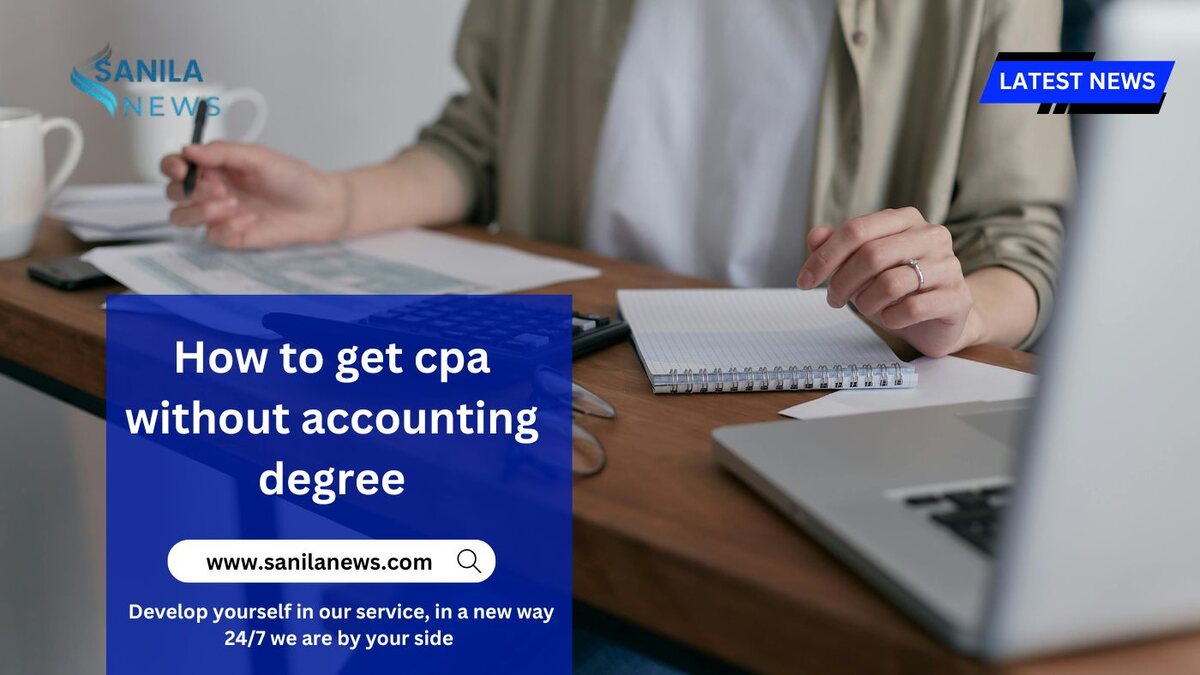How to get cpa without accounting degree Introduction
- The CPA License: Introduce what a CPA license is and why it’s a prestigious and valuable credential in the accounting profession.
- Challenges for Non-Accounting Majors: Discuss the common belief that an accounting degree is essential for becoming a CPA and the growing recognition of alternative pathways.
Section 1: Understanding the CPA Requirements
- Overview of CPA Requirements:
- Educational Requirements: Explain the standard educational requirements, typically 150 credit hours of college education, including specific coursework in accounting and business.
- Experience Requirements: Detail the required work experience, often 1-2 years under a licensed CPA, and how this applies to non-accounting degree holders.
- CPA Exam: Outline the four sections of the CPA exam: Auditing and Attestation (AUD), Business Environment and Concepts (BEC), Financial Accounting and Reporting (FAR), and Regulation (REG).
- State-by-State Variations:
- Differences in Requirements: Explain how CPA requirements vary by state, with some states being more flexible about accepting non-accounting degrees.
- Importance of Researching State Boards: Emphasize the importance of checking with the state board of accountancy for specific requirements, especially for non-traditional candidates.
Section 2: Alternative Educational Pathways
- Meeting the Educational Requirements Without an Accounting Degree:
- Supplementing Education: Discuss ways to meet the 150-credit hour requirement, such as taking additional courses at a community college, university, or online platform.
- Focus on Required Courses: Identify the key courses typically required, such as intermediate and advanced accounting, auditing, taxation, and business law, and how to obtain these credits.
- Earning a Master’s Degree:
- Master of Accounting (MAcc): Explore the option of pursuing a Master of Accounting (MAcc) program, which is open to non-accounting majors and often designed to meet CPA educational requirements.
- MBA with a Focus in Accounting: Discuss the possibility of earning an MBA with a concentration in accounting, which can also help fulfill educational requirements.
- Certificate Programs:
- Accounting Certificate Programs: Introduce certificate programs in accounting, which are designed for individuals who already hold a degree in another field but need to complete the necessary accounting coursework.
Section 3: Gaining Relevant Work Experience
- Work Experience Requirements:
- Understanding the Experience Requirement: Clarify what qualifies as acceptable work experience for CPA licensure, typically requiring supervised work under a licensed CPA.
- Opportunities for Non-Accountants: Discuss various job roles and industries where non-accounting degree holders can gain relevant experience, such as bookkeeping, financial analysis, auditing, or working in accounting departments of companies.
- Networking and Finding Opportunities:
- Leveraging Professional Networks: Emphasize the importance of networking to find work opportunities, internships, or entry-level positions that can provide relevant experience.
- Mentorship and Guidance: Highlight the benefits of seeking mentorship from CPAs or professionals in the field who can provide guidance and potentially open doors to relevant experience opportunities.
Section 4: Preparing for the CPA Exam
- The Importance of Preparation:
- Why the CPA Exam is Challenging: Discuss the difficulty of the CPA exam and why thorough preparation is crucial, especially for those without a traditional accounting background.
- Overview of CPA Exam Sections: Provide a brief overview of each section of the CPA exam and the types of knowledge and skills tested.
- Study Resources and Strategies:
- CPA Review Courses: Recommend enrolling in CPA review courses, which are designed to help candidates prepare for the exam, often including comprehensive materials, practice questions, and study plans.
- Self-Study Materials: Suggest additional study resources, such as textbooks, online courses, and practice exams, to help reinforce key concepts.
- Time Management and Study Planning: Offer advice on creating a study schedule that balances preparation with other responsibilities, including tips on managing time effectively.
Section 5: Challenges and Benefits of Becoming a CPA Without an Accounting Degree
- Challenges Faced by Non-Accounting Majors:
- Overcoming Knowledge Gaps: Discuss the challenges of lacking foundational accounting knowledge and how to address these gaps through additional coursework and self-study.
- Navigating the Licensing Process: Explore the complexities of navigating the CPA licensure process as a non-traditional candidate, including understanding state-specific requirements and finding relevant work experience.
- Benefits of a Non-Traditional Path:
- Diverse Backgrounds and Perspectives: Highlight the advantages of bringing a diverse educational background to the accounting profession, including different perspectives and problem-solving approaches.
- Career Opportunities Beyond Accounting: Discuss how the skills and knowledge gained from becoming a CPA can open up career opportunities in various fields, such as finance, management, consulting, and entrepreneurship.
Section 6: Success Stories and Testimonials
- Examples of CPAs Without Accounting Degrees:
- Real-Life Success Stories: Share inspiring stories of individuals who became CPAs without an accounting degree, focusing on their journey, challenges, and how they overcame them.
- Lessons Learned: Highlight key lessons from these success stories that can motivate and guide others on a similar path.
Section 7: Final Steps and Next Steps
- Taking Action:
- Starting the Journey: Encourage readers to take the first step by researching their state’s CPA requirements and exploring educational options that fit their situation.
- Setting Goals and Timelines: Suggest creating a roadmap with specific goals and timelines to stay on track in meeting the requirements for CPA licensure.
- Seeking Support and Resources:
- Professional Organizations and Resources: Recommend joining professional organizations like the American Institute of CPAs (AICPA) for resources, networking, and support.
- Continuing Education and Professional Development: Emphasize the importance of continuing education and staying informed about changes in CPA requirements and the accounting profession.
How to get cpa without accounting degree Conclusion
- Recap of the CPA Journey: Summarize the key points discussed, emphasizing that while the path to becoming a CPA without an accounting degree is challenging, it is achievable with dedication, preparation, and the right resources.
- Encouragement to Pursue the CPA Credential: Conclude with a motivational message encouraging readers to pursue the CPA credential, highlighting the long-term benefits and career opportunities that come with it.
How to Become a CPA Without an Accounting Degree: A Comprehensive Guide
How to get cpa without accounting degree Becoming a Certified Public Accountant (CPA) is a prestigious and rewarding achievement, but the path to earning this credential is often perceived as being exclusively reserved for those with an accounting degree. However, it is entirely possible to become a CPA without an accounting background. This guide will walk you through the steps, challenges, and strategies to achieve this goal.
How to get cpa without accounting degree Understanding the CPA Requirements
The CPA credential is regulated at the state level, and each state has its own set of requirements. However, there are general requirements that are common across most states:
- Educational Requirements: Typically, a candidate must have 150 semester hours of college education. This usually includes specific coursework in accounting and business.
- Experience Requirements: Most states require candidates to have 1-2 years of work experience under the supervision of a licensed CPA.
- CPA Exam: The CPA exam consists of four sections that test a candidate’s knowledge in auditing, business environments, financial accounting, and regulation.
How to get cpa without accounting degree Alternative Educational Pathways
If you do not have an accounting degree, there are several ways to meet the educational requirements for the CPA exam:
- Supplementing Education: If you already have a degree, you can take additional accounting and business courses to meet the requirements. These can be taken at a community college, university, or online.
- Master of Accounting (MAcc): Many MAcc programs accept students from various academic backgrounds and are designed to meet the CPA educational requirements.
- Accounting Certificate Programs: These are intensive programs that provide the essential accounting coursework needed to qualify for the CPA exam.
How to get cpa without accounting degree Gaining Relevant Work Experience
Work experience is a crucial component of the CPA licensing process. As a non-accounting major, you can gain relevant experience in various ways:
- Entry-Level Accounting Positions: Start in roles such as bookkeeping, tax preparation, or audit assistant. These positions often require supervision by a CPA, which is necessary for your licensing requirements.
- Networking: Building relationships within the accounting and finance industry can lead to job opportunities that provide the required experience.
How to get cpa without accounting degree Preparing for the CPA Exam
Preparing for the CPA exam is challenging, especially for those without a formal accounting background:
- CPA Review Courses: Enroll in a comprehensive review course that offers study materials, practice exams, and structured study plans.
- Self-Study: Supplement review courses with additional textbooks and online resources. Focus on areas where you may have knowledge gaps.
- Time Management: Create a study schedule that allows you to cover all exam sections thoroughly, balancing this with your professional and personal responsibilities.
Challenges and Benefits
Challenges:
- Knowledge Gaps: Without an accounting degree, you may have gaps in fundamental accounting principles that you need to fill through additional study.
- Navigating Requirements: Understanding the specific requirements of your state can be complex.
Stay with Sanila News to get updated news regularly.

